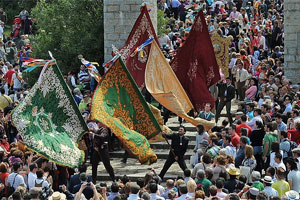The Departure of Diego
What does the celebration of La Partida de Diego entail
"The Departure of Diego" is a popular celebration that takes place in the city of Teruel, Spain. This festivity is closely related to the tragic story of the Lovers of Teruel, a legend that has endured over the centuries.
The story of the Lovers of Teruel dates back to the 13th century. Diego de Marcilla and Isabel de Segura were two young lovers from different social classes. Despite their love, the social circumstances of the time prevented them from marrying. Diego set off in search of fortune, promising Isabel that he would return in five years.
However, when Diego returned to Teruel after that period, he did so with great prosperity and wealth, but unfortunately it was already too late. Isabel, believing that her beloved had died in poverty, had married another man to fulfill her family's expectations.
Upon learning of the new situation, Diego presented himself at Isabel's house and asked for one final kiss. Isabel agreed, and as she kissed Diego, he passed away at her feet. The legend says that Isabel, filled with grief and despair, died shortly after in a loud lament.
"The Departure of Diego" commemorates this tragic event. During the celebration, the inhabitants of Teruel dress in medieval costumes and reenact scenes from the story of the Lovers, including Diego's farewell and his return. In addition, various cultural and festive activities are organized, such as parades, concerts, and theatrical performances.
This festivity is a way to keep alive the memory of the Lovers of Teruel, one of the most emblematic legends of Spanish literature and culture. The story of Diego and Isabel has been a source of inspiration for numerous writers, artists, and musicians over the centuries, and its legacy endures today through events like the "Departure of Diego."
What to See in Teruel
A city rich in history and heritage like Teruel offers a series of attractive places of interest:
- Santa María de Mediavilla Cathedral: This majestic building is a notable example of Mudéjar Gothic architecture, with an impressive facade and a rich history dating back to the 13th century.
- Plaza del Torico: It is the heart of Teruel's old town and owes its name to the small statue of a bull that adorns the square. It's a lively and picturesque place to stroll and enjoy the local atmosphere.
- The Lovers of Teruel Mausoleum: This mausoleum pays tribute to the legendary love story of Diego and Isabel. The design of the mausoleum is a work of art in itself, and the place evokes a profound sense of romance and tragedy.
- The Mausoleum of the Lovers: Located in the Church of San Pedro, this space houses the tombs of Diego and Isabel, allowing visitors to be close to the protagonists of this tragic story.
- Los Arcos Aqueduct: This ancient structure is a testament to medieval engineering and was a fundamental part of the city's water supply system.
- Provincial Museum: This museum houses a diverse collection of archaeological pieces and artworks, providing a fascinating insight into the history and culture of Teruel.
- El Salvador Tower: It offers a stunning panoramic view of the city. Climbing to the top of the tower is a unique and rewarding experience.
- Dinópolis: This theme park is an interactive journey to prehistory, with a focus on the dinosaurs that inhabited the region. It's an educational and exciting experience for the whole family.
- Modernist Interpretation Center: It highlights Teruel's unique modernist architecture, featuring a collection of elements and designs that characterize this period in the city.
- House of Music: This modernist building is an architectural gem and an essential part of Teruel's cultural heritage. Its impressive facade is a must-see for architecture enthusiasts.
- Stroll along the Old Viaduct: It offers a unique perspective of the city and its surroundings. It's a peaceful place to enjoy a scenic walk.
- Gastronomy: Teruel is famous for its exquisite Teruel Ham and other local delicacies. Don't miss trying the "trenza" from Almudévar, a delicious dessert.




